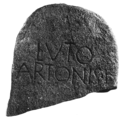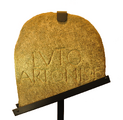VB·25 Stresa: Difference between revisions
| (3 intermediate revisions by the same user not shown) | |||
| Line 22: | Line 22: | ||
|morandi=68 | |morandi=68 | ||
|source_detail=Morandi 2004: 565 no. 68 | |source_detail=Morandi 2004: 565 no. 68 | ||
|checklevel= | |checklevel=0 | ||
}} | }} | ||
==Commentary== | ==Commentary== | ||
Images in {{bib|De Giuli 1978}}: 19 (photo = {{bib|De Giuli 1979}}: 249, fig. 4 = {{bib|Mainardis 2009}}: 337, fig. 5), {{bib|Piana Agostinetti 2004}}: 201, fig. 10.64 (drawing). | |||
Fragment of the rounded top of a mica schist stela, found in secondary context together with [[VB·22 Stresa]], [[VB·23 Stresa]], [[VB·24 Stresa]]; see [[Brisino]] for the find circumstances and context. The shape of the Roman stelae at Brisino (also [[VB·24 Stresa]]) with the rounded top is similar to that of one of the epichoric stelae from [[Levo]] ([[VB·27 Stresa]]); {{bib|De Giuli 1979}}: 251 mentions the possibility that the Brisino stones may come from the same site as the finds in [[Levo]], though it seems quite possible that a pre-Roman/Roman necropolis existed in Brisino in the area of the Chiesa di Sant'Albino. Cf. {{bib|Mainardis 2009}}: 337 f., who assumes the existence of a single workshop, pointing out that one stonemason/workshop would be able to produce stelae according to more traditional or modern tastes all dating to roughly the same time. Indeed, the gravestones from the Verbano cannot be marshalled into a clear chronological order, as factors like stone shape, frames, writing direction, letter forms and language/text formula appear in almost free combination. The present document is dated to the 1<sup>st</sup> c. BC in {{bib|AE}} 1982, no. 414, to the 1<sup>st</sup> c. AD in the Epigraphische Datenbank Heidelberg ([https://edh.ub.uni-heidelberg.de/edh/inschrift/HD001987 HD001984]); a dating to the late 1<sup>st</sup> c. BC or early 1<sup>st</sup> c. AD seems most likely (cf. [[Cerrione]] and the gravestone from Bee ({{bib|Lanza & Poletti Ecclesia 2021}}) dated to the early 1<sup>st</sup> c. AD). | Fragment of the rounded top of a mica schist stela, found in secondary context together with [[VB·22 Stresa]], [[VB·23 Stresa]], [[VB·24 Stresa]]; see [[Brisino]] for the find circumstances and context. The shape of the Roman stelae at Brisino (also [[VB·24 Stresa]]) with the rounded top is similar to that of one of the epichoric stelae from [[Levo]] ([[VB·27 Stresa]]); {{bib|De Giuli 1979}}: 251 mentions the possibility that the Brisino stones may come from the same site as the finds in [[Levo]], though it seems quite possible that a pre-Roman/Roman necropolis existed in Brisino in the area of the Chiesa di Sant'Albino. Cf. {{bib|Mainardis 2009}}: 337 f., who assumes the existence of a single workshop, pointing out that one stonemason/workshop would be able to produce stelae according to more traditional or modern tastes all dating to roughly the same time. Indeed, the gravestones from the Verbano cannot be marshalled into a clear chronological order, as factors like stone shape, frames, writing direction, letter forms and language/text formula appear in almost free combination. The present document is dated to the 1<sup>st</sup> c. BC in {{bib|AE}} 1982, no. 414, to the 1<sup>st</sup> c. AD in the Epigraphische Datenbank Heidelberg ([https://edh.ub.uni-heidelberg.de/edh/inschrift/HD001987 HD001984]); a dating to the late 1<sup>st</sup> c. BC or early 1<sup>st</sup> c. AD seems most likely (cf. [[Cerrione]] and the gravestone from Bee ({{bib|Lanza & Poletti Ecclesia 2021}}) dated to the early 1<sup>st</sup> c. AD). See also {{bib|Caramella & De Giuli 1993}}: 208 f., {{bib|Piana Agostinetti 2004}}: 201 f. | ||
See also | |||
<p style="text-align:right;>[[User:Corinna Salomon|Corinna Salomon]]</p> | <p style="text-align:right;>[[User:Corinna Salomon|Corinna Salomon]]</p> | ||
{{bibliography}} | {{bibliography}} | ||
Latest revision as of 13:43, 16 August 2024
| Object | |
|---|---|
| Classification: | stela |
|
| |
| Material: | stone |
| Size: | max. height 66 cm, max. width 66 cm, thickness 7.5 cm |
| Condition: | fragmentary |
| Autopsy by: | Corinna Salomon |
| Date of autopsy: | Apr 20 2024 |
|
| |
| Archaeological culture: | Augustan, Tiberian |
| Date: | late 1st c. BC–early 1st c. AD |
| Date derived from: | typology |
|
| |
| Site: | Stresa (Verbano-Cusio-Ossola, Piemonte, Italy) |
| Field name: | Brisino |
| Archaeological context: | medieval tomb (Objects: VB·22 Stresa, VB·23 Stresa, VB·24 Stresa, VB·25 Stresa) |
| Coordinates (approx.): | 45° 52' 5.77" N, 8° 33' 33.42" E |
| Find date: | 1975 |
| Current location: | Museo Civico Antiquarium (Mergozzo) |
| Inventory no.: | none |
|
| |
| Inscription: | VB·25 (luto/artonis:f) |
|
| |
| Alternative sigla: | Tibiletti Bruno 1981: 15b Morandi 2004: 68 |
|
| |
| Sources: | Morandi 2004: 565 no. 68 |
Images
Commentary
Images in De Giuli 1978: 19 (photo = De Giuli 1979: 249, fig. 4 = Mainardis 2009: 337, fig. 5), Piana Agostinetti 2004: 201, fig. 10.64 (drawing).
Fragment of the rounded top of a mica schist stela, found in secondary context together with VB·22 Stresa, VB·23 Stresa, VB·24 Stresa; see Brisino for the find circumstances and context. The shape of the Roman stelae at Brisino (also VB·24 Stresa) with the rounded top is similar to that of one of the epichoric stelae from Levo (VB·27 Stresa); De Giuli 1979: 251 mentions the possibility that the Brisino stones may come from the same site as the finds in Levo, though it seems quite possible that a pre-Roman/Roman necropolis existed in Brisino in the area of the Chiesa di Sant'Albino. Cf. Mainardis 2009: 337 f., who assumes the existence of a single workshop, pointing out that one stonemason/workshop would be able to produce stelae according to more traditional or modern tastes all dating to roughly the same time. Indeed, the gravestones from the Verbano cannot be marshalled into a clear chronological order, as factors like stone shape, frames, writing direction, letter forms and language/text formula appear in almost free combination. The present document is dated to the 1st c. BC in AE 1982, no. 414, to the 1st c. AD in the Epigraphische Datenbank Heidelberg (HD001984); a dating to the late 1st c. BC or early 1st c. AD seems most likely (cf. Cerrione and the gravestone from Bee (Lanza & Poletti Ecclesia 2021) dated to the early 1st c. AD). See also Caramella & De Giuli 1993: 208 f., Piana Agostinetti 2004: 201 f.
Bibliography
| AE | Various authors, L'année épigraphique, Paris: 1888–. |
|---|---|
| Caramella & De Giuli 1993 | Pierangelo Caramella, Alberto De Giuli, Archeologia dell'Alto Novarese, Mergozzo: Antiquarium Mergozzo 1993. |
| De Giuli 1978 | Alberto De Giuli, "Le stele funerarie di Brisino", Bollettino Storico per la Provincia di Novara 69/1 (1978), 13–20. |
| De Giuli 1979 | Alberto De Giuli, "Le stele funerarie di Brisino", Sibrium 14 (1978–1979), 245–252. |

